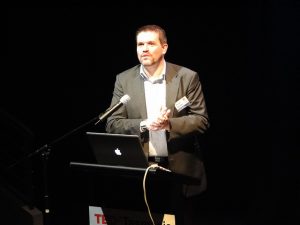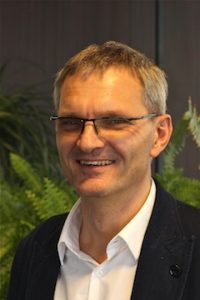
Professor Aaron Quigley
has been invited to the Winter Augmented Reality Meeting 2015 as a Keynote Speaker. WARM is an interdisciplinary meeting of experts in AR and related domains running its tenth installment. WARM2015 continues the success of previous WARM events (
WARM’05,
WARM’07,
WARM’08,
WARM’09,
WARM’10,
WARM’11,
WARM’12,
WARM’13,
WARM’14).
The organisers of WARM’15 note that the fields of Computer Graphics, Augmented Reality, Computer Vision and Ubiquitous Computing are synergistic. However, the overlap and interleaving contributions of each area has yet to be expressed and understood. The domain expert, focusing and on excelling in his or her field of research, is unable to see the connections. This meeting is a fertile ground to connect ideas and therefore seeks a variety of topics revolving around Augmented Reality and Ubiquitous Computing.
Aaron is currently on sabbatical in Japan conducting research and working on a book. Elements from both of these will form the basis for his keynote lecture in February 2015 at Graz University of Technology, Institute for Computer Graphics and Vision, Austria.
The title for his talk will be “Constructing Reality: Digital-Physical Scaffolding” and the abstract is,
Abstract:
Is the relationship between human and computer akin to a dance, where each moves effortlessly responding to the movements of the other? Or, are computers just agents who do our bidding, either undertaking direct actions on our behalf or proactively determining services, information and supports we may need on a moment to moment basis? Or, should computers continue to be best thought of as simple devices which we should turn over work to as Vannevar Bush said or thinking assistants to perform the routinizable work as Licklider suggests while we focus on creative thought and decision? Neither the beautiful dance, the agent nor the simple device seems to capture our current experience of human computer interaction. Technology underpins the human experience and digital technologies in the form of devices, computers and communications are weaving themselves into the fabric of existence. The nature of this weaving is far from uniform, distributed or even fair. For some, the impact of digital technologies are far removed from their day to day life and serve only to support some of the infrastructure of where they live, if at all. For others, digital technologies form part of the substrate of their existence and living without their mobile phone, social media apps and streaming music service seems unimaginable. Between these extremes are broad swathes of the global population who rely on digital technologies for the infrastructure in their areas and services delivered to their homes. Of course, our use and indeed reliance of technology is not new. Indeed, it is one of the defining characteristics of humans and society, our fashioning of tools, instruments and technologies to help shape our world and lives. In this talk I will discuss how we have already used technology to fashion and construct our present reality and explore ways we might create new scaffolds for the future such as enhancing our senses for a myriad of reasons from correction to replacement and enhancement.







